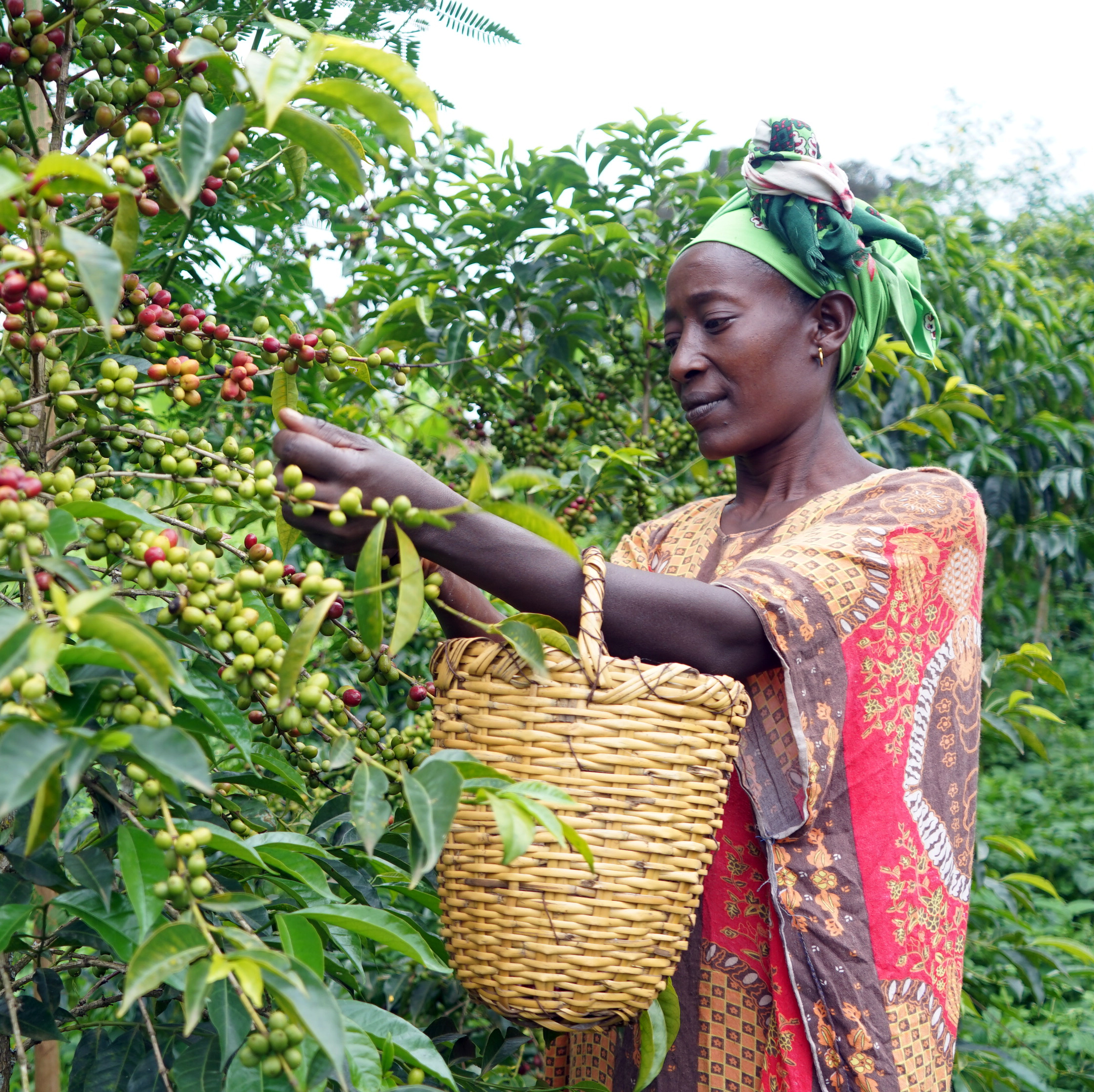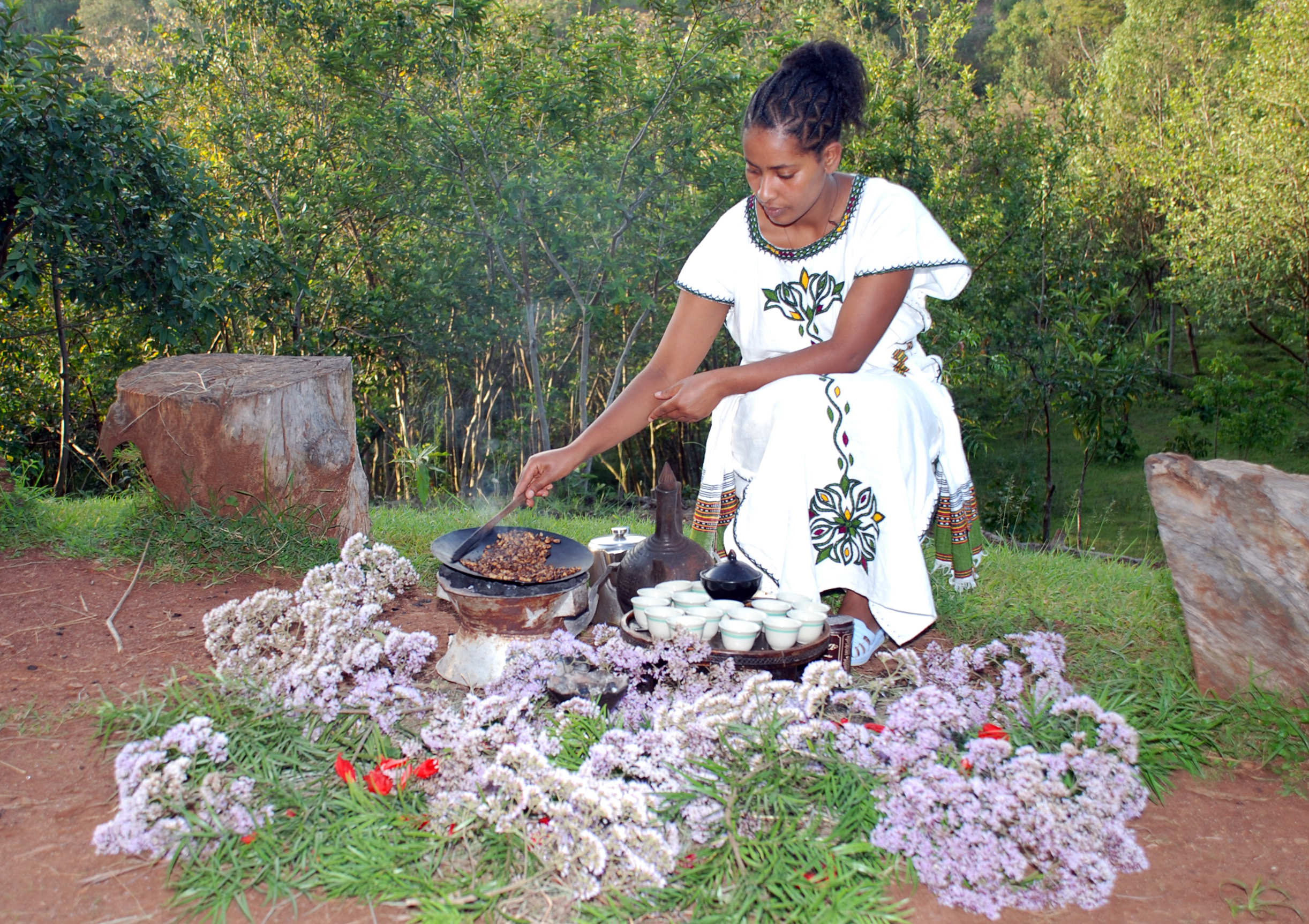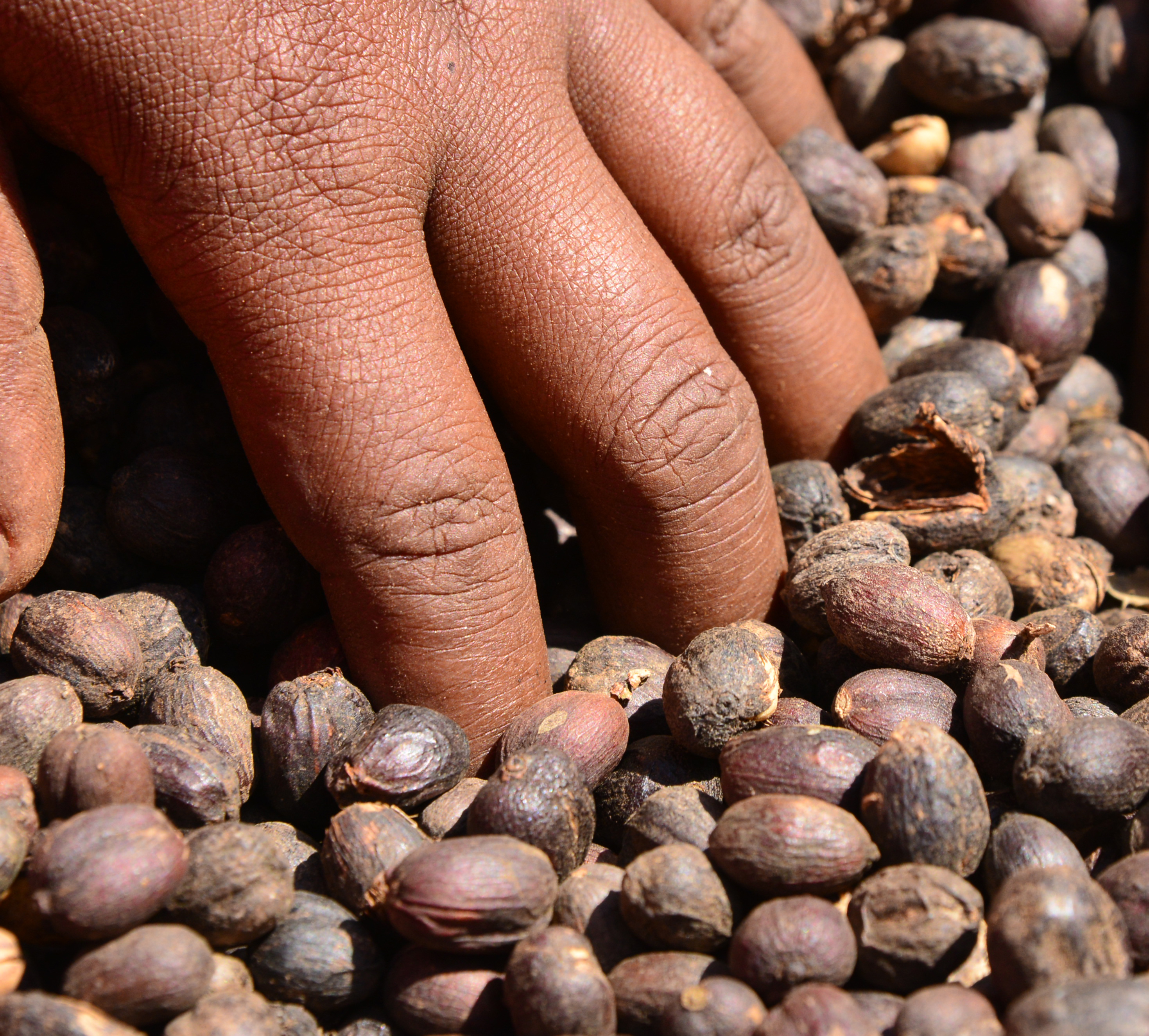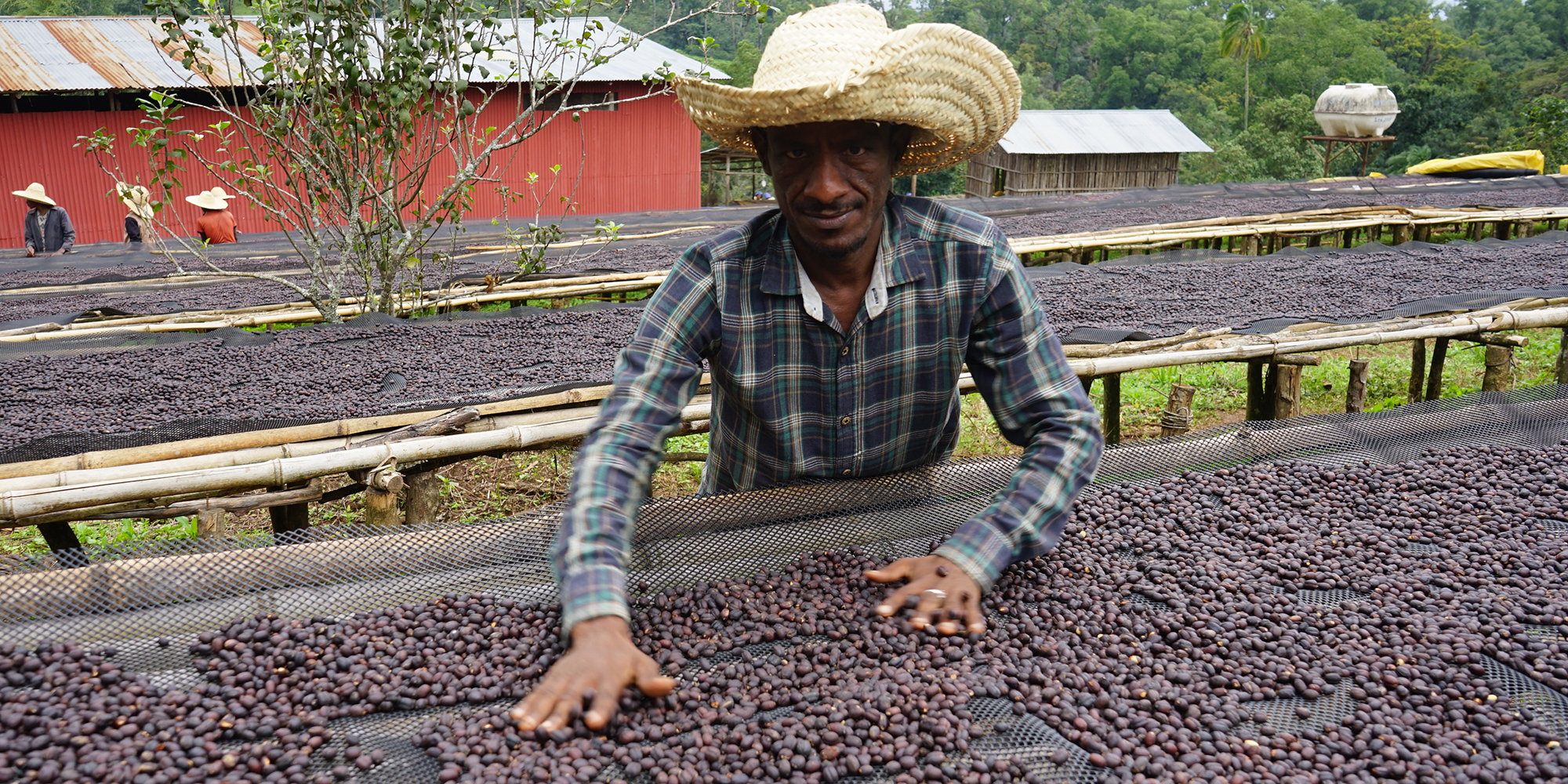As Misganaw checks to see if the beans have ripened, he contemplates the price his company might obtain at the coffee auction in Addis Ababa and whether his salary will be reflected in the price.
During the time that he has been working as a plantation manager, the world prices of coffee have risen considerably. Yet a friend has just informed him of some bad news. The friend believes that coffee prices might suddenly fall. Misganaw is in disbelief.
I’m in Kaffa in the southwest of Ethiopia and the birthplace of coffee, known for its potent Arabica brew. It is the harvest season and everyone carries a basket of woven bamboo. To reduce the strong flavour, Ethiopian coffee is sometimes blended with those from other parts of the world to meet the evolved tastes of European and American consumers. Nonetheless, and as Misganaw reminds me, the beans from this part of the world have more aroma and are important for an overall good flavour. Rightly, he believes that coffee from Kaffa is essential for any blended coffee.
 Coffee farmer Misganaw. (Photo: Nick Crane)
Coffee farmer Misganaw. (Photo: Nick Crane)
The reason that he claims his coffee is superior is that the beans have been grown slowly under the jungle canopy rather than forced to ripen in open plantations. In this part of Ethiopia, they resist clearing all of the forest when they prepare a plantation. Ethiopians like to keep the tallest trees, known locally as the Woyera, Worka and Sassa, which subsequently provide an optimum shade for the coffee bushes below. In other parts of the world, coffee growers might clear the forest entirely and plant the bushes in rows resulting in the beans being harvested easily. However, the people of Kaffa have traditionally preferred to grow coffee in the shade.
Last year, Ethiopia produced 247,000 tons of raw coffee beans. This is small on a world scale but vital for Ethiopia since coffee is its largest export and source of valuable foreign exchange. It is important for employment too. For the past three years, Misganaw has been the manager of a vast area near Bonga in the southwest of the country.
On Misganaw’s plantation, there are around 1,000 workers who are employed in the various picking, sorting and packing processes. His objective is to provide just one ton a day which puts into perspective the scale of the industry and the number of Ethiopians who depend on coffee for a livelihood. Fifteen million people work in the country’s coffee industry.
Tigist Mukre is one of the skilled pickers. She earns 150 birr a day, about $3. Other younger workers earn slightly less. When she has filled her basket, she takes it to the drying area. There are two methods of drying. The first is the traditional process of laying out the beans on flat tables in the sun for 20 days. The Kaffa region is tropical, so on most days, the beans will be washed by the rain and then dried in the hot sun. The second process they call “wash/dry”. It is faster, taking 10 to 14 days, but Tigist claims that the coffee flavour is not as good as the traditional method.
Misganaw is keen for me to taste the coffee and he suggests that we return to his office. He invites me for a “coffee ceremony”. It is not my first coffee ceremony, and I know this will take a minimum of one hour, during which time a girl will roast the beans in front of me on a charcoal fire while dropping incense onto the charcoal. The air is filled with an intense, pungent aroma when mixed with the smell of the beans that she turns slowly with a curved blade.
 Tigist Mukre is one of the skilled coffee pickers. (Photo: Nick Crane)
Tigist Mukre is one of the skilled coffee pickers. (Photo: Nick Crane)
‘Coffee and love taste best when hot’ — Ethiopian proverb
While the beans are roasting, I ask Misganaw why he is worried about the price of coffee. After all, it has risen inexorably over the past 20 years, so why should this not continue? He explains that his plantation owner sells their coffee to a French company near Bordeaux and he claims that they get a fair price. He believes that the arrangement is good for them but that he is not involved on the commercial side. Nonetheless, the price paid by the importer is never far from that on world markets.
Then he spills the beans. He starts talking about the Agoa or “African Growth and Opportunity Act” passed by the American Congress in 2015. He is not entirely sure what this means but has heard that the US has just cancelled this agreement due to the war in faraway Tigray in northern Ethiopia. (Ethiopia lost its Agoa beneficiary status effective 1 January 2022.)
 The elaborate Ethiopian coffee ceremony is an integral part of social life in the country. (Photo: Nick Crane)
The elaborate Ethiopian coffee ceremony is an integral part of social life in the country. (Photo: Nick Crane)
In northern Ethiopia and especially in Tigray province, thousands have died over the past year and there is talk, once again, of massive famine. His friend has told him that the Americans want to see the internal conflict come to an end, but some Ethiopians see this as supporting the Tigrinian breakaway state. In addition, tariffs might be additionally imposed on Ethiopian goods, including coffee, which would result in international buyers sourcing from other parts of the world.
“If the Americans stop buying our coffee, then prices will fall. We will be poor again.” He stares at the beans that Tigist turns constantly to maintain an even roast.
During the short time that he has heard this news, it has clearly played on his mind. He is a modest, unassuming man, but he understands the economic impact of tariffs on coffee. He has a degree in agriculture from Jimma University.
“If prices fall as a result of coffee tariffs, then we will be back to the old days when we didn’t have fair trade,” a description now synonymous with assuring the world’s poorest countries with a fair price for their products.
I’m reminded of a dispute with Starbucks a decade ago when the multinational was accused of not paying a fair price for African coffee. After much bad press, the international coffee chain was obliged to recognise the many Ethiopian brands including Yirgasheffe, Harar, Kaffa and Sidamo. After a short social media campaign, Starbucks quickly conceded, and a better price was agreed for Ethiopian coffee.
I inform him that a cup of coffee costs about 150 birr ($3) in a coffee shop in Western countries. It is not lost on either of us that this is about the same as Tigist earns for a day’s work. He doesn’t react — he probably already knows that the coffee trading is never exactly equitable but at least some small foreign importers make some attempts to support communities.
Meanwhile, it is evident for both of us that a war that is raging in the north of the country, 1,600km away, could affect the people of Kaffa. Through no fault of their own, this conflict could have a significant influence on the lives of these gentle, hard-working people. This time multinational politics rather than commercial meanness could be the culprit.
 Ethiopia is the origin of modern coffee. (Photo: Nick Crane)
Ethiopia is the origin of modern coffee. (Photo: Nick Crane)
Although vital for the Ethiopian economy, and its most important export, Ethiopian coffee still only represents 3% of worldwide production. The price on world markets might not take a spiral dive, but I understand Misganaw’s concern.
I try to reassure him. “America is not the only country where coffee is consumed, and anyway many other countries prefer a good brew over price.”
He gives me a big grin, and Tigist suggests another cup. In Ethiopia, it is customary to be offered three cups at a coffee ceremony. I accept willingly — her coffee really is very good.
Misganaw reminds me once more once of the Ethiopian proverb, “Coffee and love taste best when hot.” His smile returns as he translates it for Tigist in her own language and I notice the twinkle in her eye.
The people of Kaffa are never sad for long. DM
Nick Crane is owner of the highest hotel in Africa, Simien Lodge, in the Simien Mountains, Ethiopia. He also offers tours to unusual parts of Ethiopia through his tour company Ethiopian Adventures.




 Ethiopia is the origin of modern coffee. (Photo: Nick Crane)
Ethiopia is the origin of modern coffee. (Photo: Nick Crane)